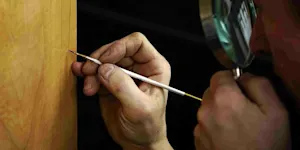What Makes This Word Tick
Ah, "quire"—not a word you hear every day. In modern terms, a "quire" often refers to a bundle of 24 or 25 sheets of paper. It’s a term from the printing world, charmingly quaint and evocative of the analog days of ink-stained fingers and the smell of fresh paper. Dive into the past, and you’ll find it filled with even more nuanced meanings.
If Quire Were a Person…
Quire would be that thoughtful bookbinder next door, forever surrounded by the comforting rustle of pages. Always slightly old-fashioned, yet knowledgeable about things that never seem to go out of style, like handwriting letters or reading by candlelight.
How This Word Has Changed Over Time
Originally, "quire" came from the Latin "quaterni," meaning "four each," referring to the fact that the sheets were often folded into groups of four. Its use has shifted over time, but it retains its place among the vocabulary of bibliophiles and paper enthusiasts today.
Old Sayings and Proverbs That Use Quire
While "quire" doesn't feature prominently in old sayings, it carries an echo of its use in phrases about diligence and organization, as in keeping one's papers in order. It's a reminder of when paper was precious and organization a virtue.
Surprising Facts About Quire
A quire of paper actually comes in different counts, varying by paper size and thickness. Historically, it sometimes consisted of 24 sheets, and other times, 25. The tradition likely started in the 15th century when paper-making was both an art and a science.
Out and About With This Word
You might encounter "quire" at specialized stationery stores or historical libraries. It’s a word with its feet firmly planted in the realms of academia, artisanal publishing, and the hearts of those who appreciate the tactile joys of good paper.
Pop Culture Moments Where Quire Was Used
While "quire" doesn't frequently appear in pop culture, its relatives, like "quarto" or "folio," enjoy mentions in literary circles and period dramas, conjuring images of scribes hunched over desks, feverishly penning the next great tome.
The Word in Literature
In literature, one might find "quire" in historical novels or works focused on the printing press era. It sings of a time when the written word was crafted laboriously by hand, each sheet a testament to patience and artistry.
Moments in History with Quire
Imagine the momentous invention of Gutenberg's press: while the word "quire" wasn't in the headlines, its spirit was there. Quire speaks to the importance of preservation and spread of knowledge, an unsung hero in the history of the book.
This Word Around the World
In some languages, "quire" translates to terms meaning "to gather" or "fold," reflecting its practical use. European cultures historically embraced it, such as the French "quaire," maintaining its literary essence across borders.
Where Does It Come From?
The word "quire" can trace its etymological roots back to the Latin "quaterni," which evolved through Old French. It has maintained its importance as a cornerstone in the assembly of written works.
How People Misuse This Word
A common misuse of "quire" is its confusion with "choir"—those angelic singers filling cathedrals with harmonies. While "quire" is all about paper, "choir" rings with musicality.
Words It’s Often Confused With
Choir: A group of singers, not sheets of paper.
Quarry: A place for extracting stone, not related to pages.
Quarter: A fourth part, easily mixed up with historic "quarters" of paper.
Additional Synonyms and Antonyms
Synonyms for quire might include ream (in broader terms), bundle, or stack. Antonyms would be individual sheets or loose leaf.
Want to Try It Out in a Sentence?
How about this: "The dusty old bookstore boasted a fine selection of printing supplies, including quills, ink, and a splendid quire of fine vellum paper."
















